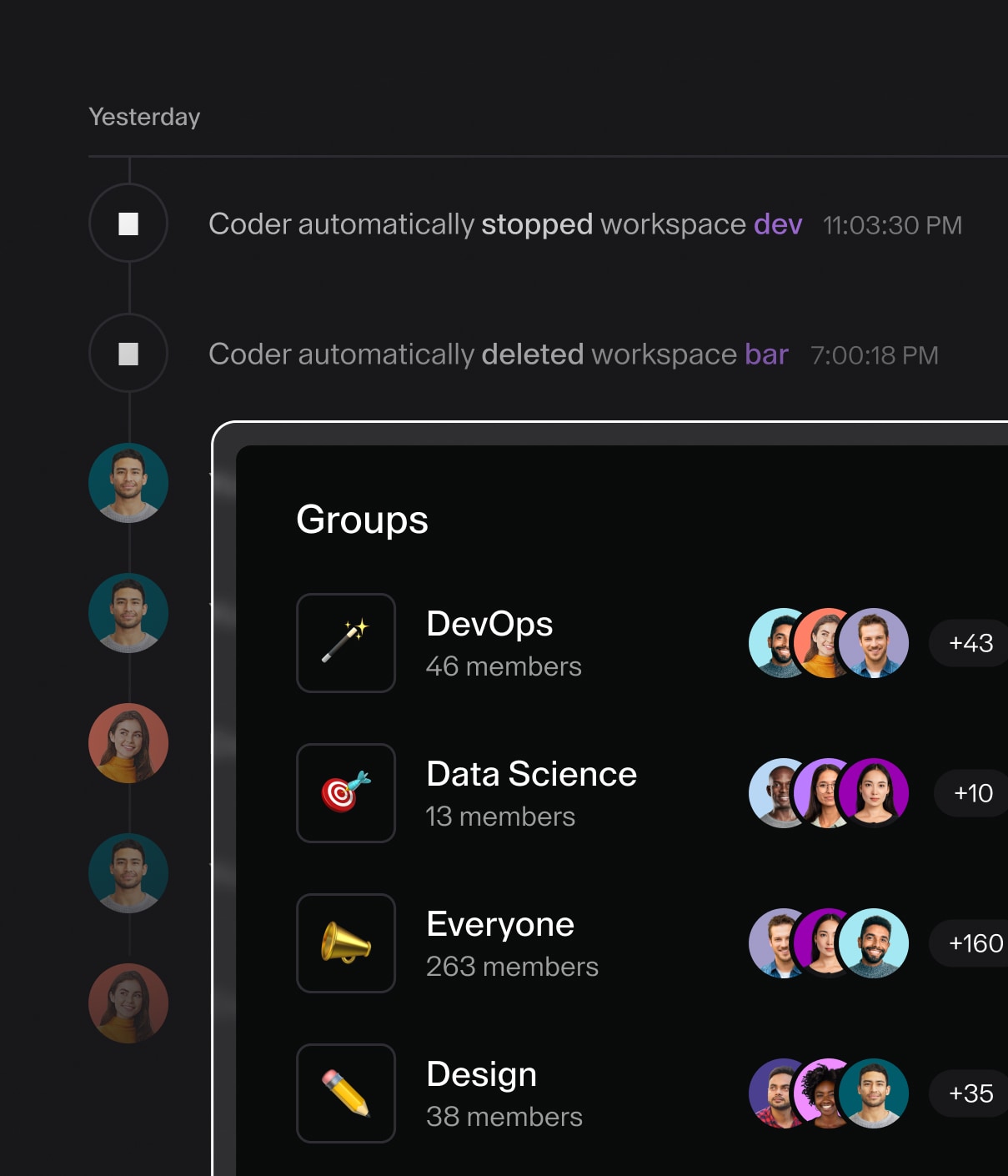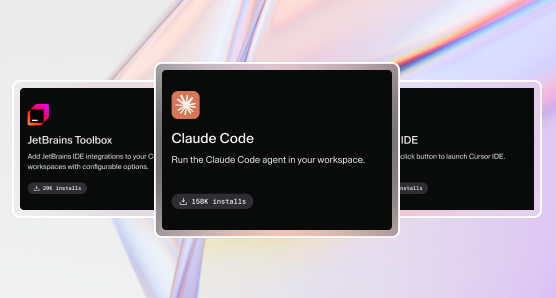Offline deployments
Coder can run in offline / air-gapped environments.
Building & push a custom Coder image
First, build and push a container image extending our official image with the following:
- Terraform (supported versions)
- CLI config (.tfrc) for Terraform referring to external mirror
- Terraform Providers for templates
- These could also be specified via a volume mount (Docker) or network mirror. See below for details.
Here's an example:
# Dockerfile
FROM ghcr.io/coder/coder:latest
USER root
RUN apk add curl unzip
# Create directory for the Terraform CLI (and assets)
RUN mkdir -p /opt/terraform
# In order to run Coder airgapped or within private networks,
# Terraform has to be bundled into the image in PATH or /opt.
#
# See https://github.com/coder/coder/blob/main/provisioner/terraform/install.go#L23-L24
# for supported Terraform versions.
ARG TERRAFORM_VERSION=1.3.0
RUN curl -LOs https://releases.hashicorp.com/terraform/${TERRAFORM_VERSION}/terraform_${TERRAFORM_VERSION}_linux_amd64.zip \
&& unzip -o terraform_${TERRAFORM_VERSION}_linux_amd64.zip \
&& mv terraform /opt/terraform \
&& rm terraform_${TERRAFORM_VERSION}_linux_amd64.zip
ENV PATH=/opt/terraform:${PATH}
# Additionally, a Terraform mirror needs to be configured
# to download the Terraform providers used in Coder templates.
#
# There are two options:
# Option 1) Use a filesystem mirror. We can seed this at build-time
# or by mounting a volume to /opt/terraform/plugins in the container.
# https://developer.hashicorp.com/terraform/cli/config/config-file#filesystem_mirror
#
# Be sure to add all the providers you use in your templates to /opt/terraform/plugins
RUN mkdir -p /opt/terraform/plugins
ADD filesystem-mirror-example.tfrc /opt/terraform/config.tfrc
# Optionally, we can "seed" the filesystem mirror with common providers.
# Coder and Docker. Comment out lines 40-49 if you plan on only using a
# volume or network mirror:
RUN mkdir -p /opt/terraform/plugins/registry.terraform.io
WORKDIR /opt/terraform/plugins/registry.terraform.io
ARG CODER_PROVIDER_VERSION=0.5.3
RUN echo "Adding coder/coder v${CODER_PROVIDER_VERSION}" \
&& mkdir -p coder/coder && cd coder/coder \
&& curl -LOs https://github.com/coder/terraform-provider-coder/releases/download/v${CODER_PROVIDER_VERSION}/terraform-provider-coder_${CODER_PROVIDER_VERSION}_linux_amd64.zip
ARG DOCKER_PROVIDER_VERSION=2.22.0
RUN echo "Adding kreuzwerker/docker v${DOCKER_PROVIDER_VERSION}" \
&& mkdir -p kreuzwerker/docker && cd kreuzwerker/docker \
&& curl -LOs https://github.com/kreuzwerker/terraform-provider-docker/releases/download/v${DOCKER_PROVIDER_VERSION}/terraform-provider-docker_${DOCKER_PROVIDER_VERSION}_linux_amd64.zip
RUN chown -R coder:coder /opt/terraform/plugins
WORKDIR /home/coder
# Option 2) Use a network mirror.
# https://developer.hashicorp.com/terraform/cli/config/config-file#network_mirror
# Be sure uncomment line 60 and edit network-mirror-example.tfrc to
# specify the HTTPS base URL of your mirror.
# ADD network-mirror-example.tfrc /opt/terraform/config.tfrc
USER coder
# Use the tfrc file to inform
ENV TF_CLI_CONFIG_FILE=/opt/terraform/config.tfrc
# filesystem-mirror-example.tfrc
provider_installation {
filesystem_mirror {
path = "/opt/terraform/plugins"
}
}
# network-mirror-example.tfrc
provider_installation {
network_mirror {
url = "https://terraform.example.com/providers/"
}
}
Run offline via Docker
Follow our docker-compose documentation and modify the docker-compose file to specify your custom Coder image. Additionally, you can add a volume mount to add providers to the filesystem mirror without re-building the image.
First, make a create an empty plugins directory:
mkdir $HOME/plugins
Next, add a volume mount to docker-compose.yaml:
vim docker-compose.yaml
# docker-compose.yaml
version: "3.9"
services:
coder:
image: registry.example.com/coder:latest
volumes:
- ./plugins:/opt/terraform/plugins
# ...
database:
image: registry.example.com/postgres:13
# ...
The terraform providers mirror command can be used to download the required plugins for a Coder template. This can be uploaded into the
pluginsdirectory on your offline server.
Run offline via Kubernetes
We publish the Helm chart for download on GitHub Releases. Follow our Kubernetes documentation and modify the Helm values to specify your custom Coder image.
# values.yaml
coder:
image:
repo: "registry.example.com/coder"
tag: "latest"
# ...


